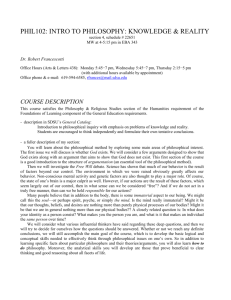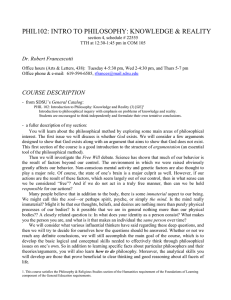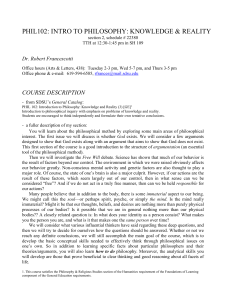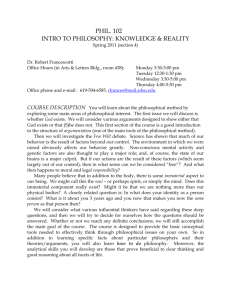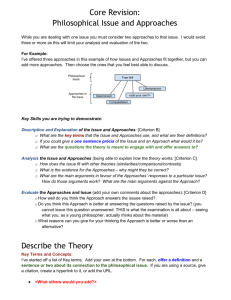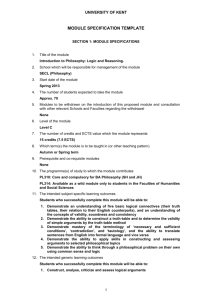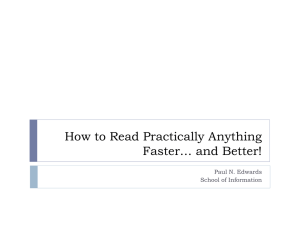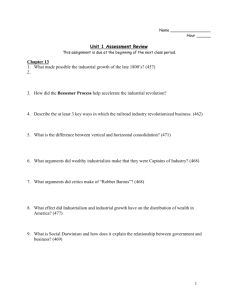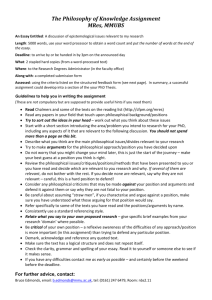Phil 102 Intro to Philosophy: Knowledge and Reality (Francescotti)
advertisement
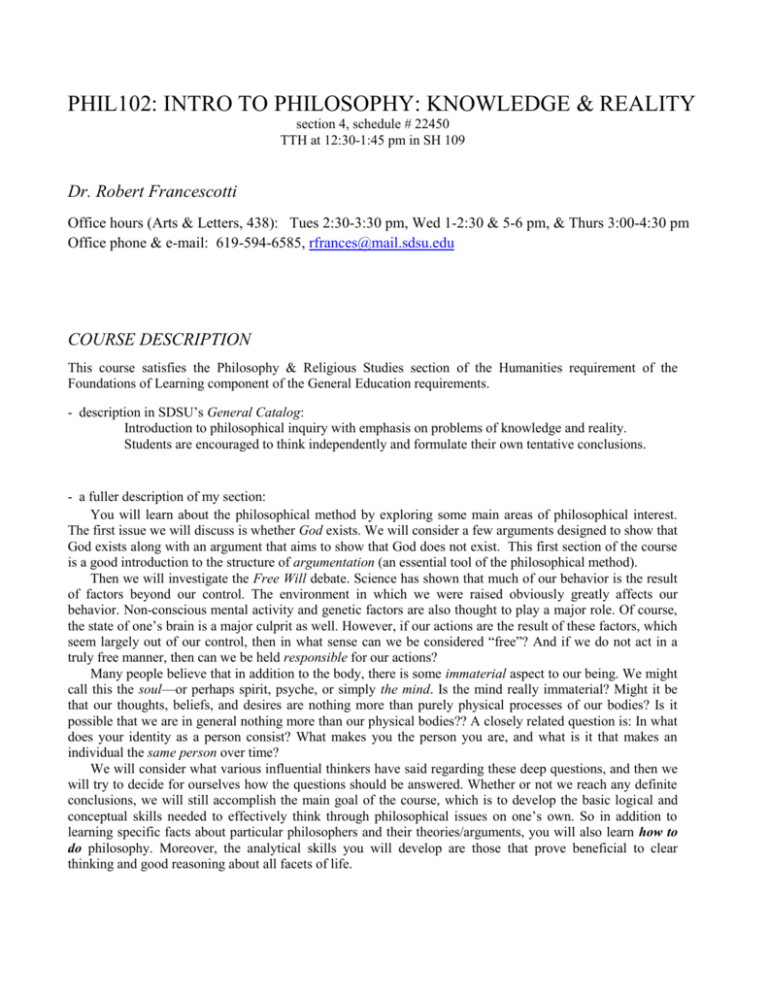
PHIL102: INTRO TO PHILOSOPHY: KNOWLEDGE & REALITY section 4, schedule # 22450 TTH at 12:30-1:45 pm in SH 109 Dr. Robert Francescotti Office hours (Arts & Letters, 438): Tues 2:30-3:30 pm, Wed 1-2:30 & 5-6 pm, & Thurs 3:00-4:30 pm Office phone & e-mail: 619-594-6585, rfrances@mail.sdsu.edu COURSE DESCRIPTION This course satisfies the Philosophy & Religious Studies section of the Humanities requirement of the Foundations of Learning component of the General Education requirements. - description in SDSU’s General Catalog: Introduction to philosophical inquiry with emphasis on problems of knowledge and reality. Students are encouraged to think independently and formulate their own tentative conclusions. - a fuller description of my section: You will learn about the philosophical method by exploring some main areas of philosophical interest. The first issue we will discuss is whether God exists. We will consider a few arguments designed to show that God exists along with an argument that aims to show that God does not exist. This first section of the course is a good introduction to the structure of argumentation (an essential tool of the philosophical method). Then we will investigate the Free Will debate. Science has shown that much of our behavior is the result of factors beyond our control. The environment in which we were raised obviously greatly affects our behavior. Non-conscious mental activity and genetic factors are also thought to play a major role. Of course, the state of one’s brain is a major culprit as well. However, if our actions are the result of these factors, which seem largely out of our control, then in what sense can we be considered “free”? And if we do not act in a truly free manner, then can we be held responsible for our actions? Many people believe that in addition to the body, there is some immaterial aspect to our being. We might call this the soul—or perhaps spirit, psyche, or simply the mind. Is the mind really immaterial? Might it be that our thoughts, beliefs, and desires are nothing more than purely physical processes of our bodies? Is it possible that we are in general nothing more than our physical bodies?? A closely related question is: In what does your identity as a person consist? What makes you the person you are, and what is it that makes an individual the same person over time? We will consider what various influential thinkers have said regarding these deep questions, and then we will try to decide for ourselves how the questions should be answered. Whether or not we reach any definite conclusions, we will still accomplish the main goal of the course, which is to develop the basic logical and conceptual skills needed to effectively think through philosophical issues on one’s own. So in addition to learning specific facts about particular philosophers and their theories/arguments, you will also learn how to do philosophy. Moreover, the analytical skills you will develop are those that prove beneficial to clear thinking and good reasoning about all facets of life. GENERAL EDUCATION “ESSENTIAL CAPACITIES”& GOALS Philosophy 102 is a General Education (GE) course. The “seven essential capacities” (listed on p. 90 of the 2014-15 General Catalog) that San Diego State’s GE program aims to develop in students are the ability to: - construct, analyze, and communicate arguments - apply theoretical models to the real world - contextualize phenomena - negotiate differences - integrate global and local perspectives - illustrate relevance of concepts across boundaries - evaluate consequences of actions. Phil 102 is a member of the Humanities and Fine Arts group of GE courses, and the goals for this set of courses (p. 91 of the General Catalog) are to enable students to - analyze written, visual, or performed texts in the humanities and fine arts with sensitivity to their diverse cultural contexts and historical moments - develop a familiarity with various aesthetic and other value systems and the ways they are communicated across time and cultures. - argue from multiple perspectives about issues in the humanities that have personal and global relevance. - demonstrate the ability to approach complex problems and ask complex questions drawing upon knowledge of the humanities. SPECIFIC LEARNING OUTCOMES The specific learning outcomes for this course are that students are expected to demonstrate the ability to: - identify when a discussion counts as philosophical - identify arguments and their main components - clearly explain and distinguish between each of the theories discussed in the class - identify problems with and merits of each of the theories and arguments presented - speculate on how the theories might be modified to avoid the objections raised - critically evaluate arguments and theories in a variety of philosophical contexts - think and write in a clearer, more logically rigorous fashion - develop and defend your own views on the philosophical topics discussed . REQUIRED TEXTS & READINGS A course packet (Phil 102: Readings) available at CalCopy contains the following: - Cover and Garns, Theories of Knowledge and Reality, 2nd ed. (McGraw Hill, 1994) — ch. 2: sec. 1a (“Arguments”) & sec. 1b (“Deduction”). - St. Thomas Aquinas, “The Five Ways,” from Summa Theologica, written from 1265–1274. Reprint in Perry & Bratman (eds.), Introduction to Philosophy: Classical & Contemporary Readings (Oxford University Press, 1986). - St. Anselm, from Proslogiun, 1077-1078. Reprint in Feinberg and Shafer-Landau (eds.), Reason and Responsibility, 13th edition (Wadsworth, 2008). - Cover and Garns, Theories of Knowledge and Reality, 2nd ed. (McGraw Hill, 1994) — ch. 2: sec. 1c (“Induction”) - William Paley, excerpts from Natural Theology, published in 1802. Reprint in Feinberg and Shafer-Landau (eds.), Reason and Responsibility, 13th edition (Wadsworth, 2008). - Fyodor Dostoevsky, from The Brothers Karamozov, published in 1880. The course packet contains excerpts under the title, “Rebellion,” reprinted in Feinberg and Shafer-Landau. - Blaise Pascal, from Pensees, published in 1669. In Blaise Pascal, Penees and Other Writings, Honor Levi, trans. (Oxford University Press, 1995). - excerpts from Paul Holbach’s System of Nature, 1770. The course packet contains the reprint under the title, “The Illusion of Free Will,” in Feinberg (ed.), Reason and Responsibility, 8th edition (Wadsworth, 1993). - Clarence Darrow, “The Crime of Compulsion: Leopold and Loeb,” in Weinberg (ed.), Attorney for the Damned, (University of Chicago Press, 1957). - Walter Stace, “The Problem of Free Will,” from his Religion and the Modern Mind (J. B. Lippincott Company, 1952). Reprint in Pojman (ed.), Philosophy: The Quest for Truth, 6th edition (Oxford University Press, 2006). - excerpts from Richard Taylor’s Metaphysics (Prentice-Hall, 1992). - Rene Descartes, from Meditations on First Philosophy, 1641. Reprint in Pojman (ed.), Classics of Philosophy (Oxford University Press, 1998). - Rene Descartes, Treatise on Man, 1664 -- in Cottingham, Stoothoff, and Murdoch (trans.), Philosophical Writings of Rene Descartes, vol I (Cambridge University Press, 1985). - Cover & Garns, Theories of Knowledge and Reality, 2nd ed. (McGraw Hill, 1994) -- ch. 2, sec. 3: “Dualism and the Relationship Problem” - Gottfried Wilhelm Leibniz, “Third Explanation of the New System” (1696), from G. W. Leibniz, Philosophical Texts, translated and edited by R. S. Woolhouse and Richard Francks (Oxford, 1998). - John Locke “Of Ideas of Identity and Diversity” from An Essay Concerning Human Understanding, 1690. Reprint in Perry & Bratman (eds.), Introduction to Philosophy: Classical & Contemporary Readings (Oxford, 1986). - Thomas Reid, “Of Mr. Locke’s Account of Our Personal Identity,” in Essays on the Intellectual Powers of Man, 1785. Reprint in Feinberg and Shafer-Landau (eds.), Reason and Responsibility, 13th edition (Wadsworth, 2008). SCHEDULE: dates, topics & readings (the schedule is tentative and may vary depending on the amount of class discussion) 1/22 1/27 1/29 Introduction to the course Arguments - more on arguments (ch. 2, secs. 1a and 1b from Cover and Garns, Theories of Knowledge and Reality) - introducing the Causal Argument for the existence of God 2/3 the Causal Argument (St. Thomas Aquinas, “The Five Ways,” from Summa Theologica) 2/5, 2/10 Anselm’s Ontological Argument (St. Anselm, from Proslogiun, and Guanilo’s reply) 2/12 Inductive vs. Deductive Arguments, and Arguments by Analogy (ch. 2, sec. 1c from Cover and Garns) 2/17 The Teleological Argument (William Paley, excerpts from Natural Theology) EXAM I February 19th 2/24 The Problem of Evil (Fyodor Dostoevsky, “Rebellion” from The Brothers Karamozov) 2/26 more on the Problem of Evil 3/3 Pascal’s Wager (Blaise Pascal, from Pensees) 3/5 Introducing to the Free Will/Determinism debate 3/10 Hard Determinism (Paul Holbach, “The Illusion of Free Will” from System of Nature) 3/12 Hard Determinism (Clarence Darrow, “Leopold and Loeb: The Crime of Compulsion”) 3/17 Compatibilism (Walter Stace, “The Problem of Free Will” from Religion and the Modern Mind) 3/19 Indeterminism 3/24 Agency Theory (excerpts from Richard Taylor’s Metaphysics) EXAM II March 26th 4/7 4/9 4/14 4/16 4/21 Intro to the Mind-Body Problem Skepticism and the External World (Rene Descartes, Meditations I, II) and an argument for Dualism more arguments for Dualism (Descartes, from Meditation VI, and Leibniz’ “Third Explanation”) Interactionism (Rene Descartes, Treatise on Man and Cover & Garns, “Dualism and the Relationship Problem”) - Parallelism (Gottfried Leibniz’ letter, “Third Explanation of the New System”) - Materialism & the Identity Theory 4/23 - Identity Theory vs. Logical Behaviorism; and the Artificial Intelligence debate - Materialist responses to arguments for Dualism 4/28 Intro to Personal Identity 4/30 Bodily Substance and Bodily Continuity 5/5 Locke’s Mental Continuity Account (John Locke, “Of Ideas of Identity and Diversity”) 5/7 Objections to Locke’s Account (Thomas Reid, “Of Mr. Locke’s Account of Our Personal Identity”) EXAM III May 14th (during final exam week) GRADES & REQUIREMENTS Your final grade is based on the percentage of 300 possible points you earn on 3 essay exams. Exam I is on February 19th —worth up to 80 possible pts. Exam II is on March 26th —worth up to 100 possible pts. Exam III on May 14th —worth up to 120 possible pts. (May 14th is during finals week, and according to the final exam schedule, our final exam is to start at 10:30 am on that day.) The exams must be taken at the scheduled times. I will allow make-ups only for those with a compelling reason for missing, and I must be notified prior to the exam to judge if the reason is compelling enough. The number of points you earn on the exams is your BASE SCORE, which may be influenced by: Discretionary Points On the basis of meritorious behavior such as class participation and significant improvement in grades, I might add a point or two or perhaps even a few to your base score. For example, suppose you receive a grand total of 237 pts on the exams. 237 is 79% of 300, which gives you C+. But if you participated very well in class discussion and also showed significant improvement in grades, then I might add 3 pts, for example, to the 237 which would give you 240. Since 240 is 80% of 300, you would move up to the bottom of the B- range in that case. (See percentage/letter grade conversion chart below.) But note: points for positive performance in one area (such as improved grades) might be eliminated or even outweighed by negative performance in another area (for example, evidence that you’re not doing the readings, or disruptive classroom behavior). So your final score could end up being lower than your base score, and in some cases this could result in a lower letter grade being assigned. (Imagine a change the opposite of that described above—going from 240 to 237.) In particular, ATTENDANCE is especially important, for whether or not you actually participate in class discussion on a particular day, attendance is necessary to even be prepared to participate. So I’ll keep track of attendance and subtract 1.5 pts per absence from the total base score (the points earned out of 300). With poor attendance, then, the base score could be lowered quite a bit. Here’s how the percentages convert to letter grades: 92.5—100 89.5—92.49 86.5—89.49 82.5—86.49 79.5—82.49 76.5—79.49 72.5—76.49 A AB+ B BC+ C 69.5—72.49 66.5—69.49 62.5—66.49 59.5—62.49 below 59.5 CD+ D DF Academic Misconduct: Cheating and Plagiarism It is your responsibility to know and observe all the SDSU rules concerning academic integrity and plagiarism. You should familiarize yourself with SDSU Academic Senate Policy on Plagiarism http://senate.sdsu.edu/policy/pfacademics.html. Here are some highlights: 2.0 Definitions 2.1 Cheating shall be defined as the act of obtaining or attempting to obtain credit for academic work by the use of dishonest, deceptive, or fraudulent means. Examples of cheating include, but are not limited to (a) copying, in part or in whole, from another’s test or other examination; (b) discussing answers or ideas relating to the answers on a test or other examination without the permission of the instructor; (c) obtaining copies of a test, an examination, or other course material without the permission of the instructor; (d) using notes, cheat sheets, or other devices considered inappropriate under the prescribed testing condition; (e) collaborating with another or others in work to be presented without the permission of the instructor; (f) falsifying records, laboratory work, or other course data; (g) submitting work previously presented in another course, if contrary to the rules of the course; (h) altering or interfering with the grading procedures; (i) plagiarizing, as defined; and (j) knowingly and intentionally assisting another student in any of the above. 2.2 Plagiarism shall be defined as the act of incorporating ideas, words, or specific substance of another, whether purchased, borrowed, or otherwise obtained, and submitting same to the University as one’s own work to fulfill academic requirements without giving credit to the appropriate source. Plagiarism shall include but not be limited to (a) submitting work, either in part or in whole, completed by another; (b) omitting footnotes for ideas, statements, facts, or conclusions that belong to another; (c) omitting quotation marks when quoting directly from another, whether it be a paragraph, sentence, or part thereof; (d) close and lengthy paraphrasing of the writings of another; (e) submitting another person’s artistic works, such as musical compositions, photographs, paintings, drawings, or sculptures; and (f) submitting as one’s own work papers purchased from research companies. Student Disability Services Any students with special needs due to a documented medical condition should avail themselves of the resources at Student Disability Services, Calpulli Center, room 3101, (619)594-6473, http://www.sa.sdsu.edu/sds “Student Disability Services provides support services for students with mobility limitations, learning disabilities, hearing or visual impairments, psychological disabilities, attention deficit disorder, and other disabilities. Counselors are available to assist students in making personal, academic, and vocational choices, and to advise how best to utilize campus resources. Prior to receiving assistance, students must furnish appropriate medical or psycho-educational documentation to Student Disability Services” (p. 33, 2014-15, General Catalog). “If you are a student with a disability and believe you will need accommodations for this class, it is your responsibility to contact Student Disability Services at (619) 594-6473. To avoid any delay in the receipt of your accommodations, you should contact Student Disability Services as soon as possible. Please note that accommodations are not retroactive, and that accommodations based upon disability cannot be provided until you have presented your instructor with an accommodation letter from Student Disability Services. Your cooperation is appreciated.” Pamela J. Starr, Director, Student Disability Services Religious Observances “By the end of the second week of classes, students should notify the instructors of affected courses of planned absences for religious observances. Instructors shall reasonably accommodate students who notify them in advance of planned absences for religious observances” (p. 20, 2014-15, General Catalog). Please notify me by the end of the second week of classes if you plan to be absent for “religious observances.”
